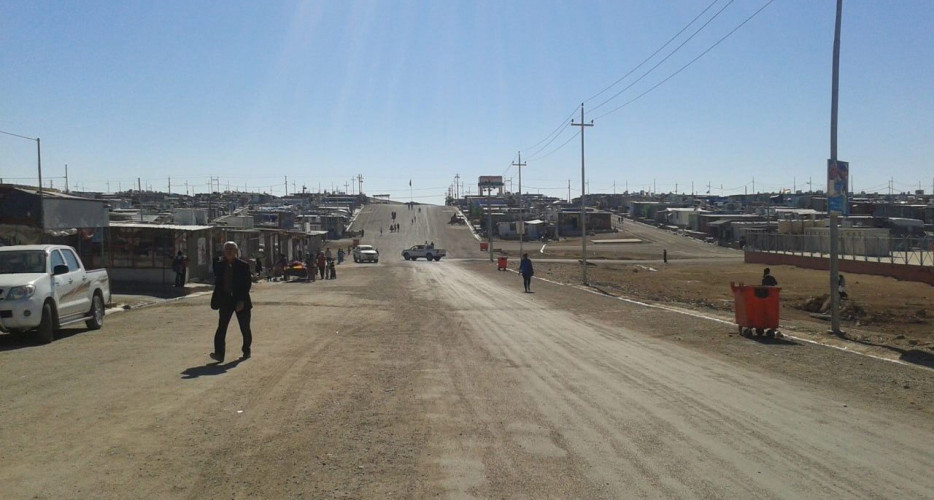Syrian Kurdish refugees reluctant to return home despite regional moves to normalize Damascus

Peregraf- Ammar Aziz
It will not make any difference to Haval Sabri if the situation in Syria changes. He now lives in Duhok as a refugee and, as long as he is allowed to stay, he will not return to home to northeast Syria.
Sabri’s insistence on remaining in the Kurdistan Region is on a collision course with efforts by Iraq’s federal government to convince refugees to voluntarily return to Syria amid the ongoing normalization process with Damascus by Arab countries.
"It is true that the situation in Syria is different than before and has calmed down to some extent, but for me it is not very different because my problem is with a political party in northeastern Syria," Sabri told Peregraf.
When he first left his home, he initially went to Duhok, before spending time in Germany. But he returned to Duhok, explaining that "Kurdistan is more peaceful and better than anywhere else for me."
On May 1, the foreign ministers of Iraq, Jordan, Saudi Arabia, Syria, and Egypt met in Amman as part of a regional process to normalize the Syrian regime and readmit it to the Arab League. Assad’s government had been expelled from many international and regional bodies and cut-off bilaterally by its neighbors at the start of the brutal civil war in 2011.
Among the topics that the foreign ministers discussed was the millions of displaced Syrians from all over the country. In a statement issued after the meeting, they said that "the voluntary and safe return of refugees to their country is an urgent priority. The necessary steps to bring about such a return must be taken immediately."
"Promoting cooperation between the Syrian government and refugee-hosting states and coordinating with the relevant UN organs to organize the voluntary and safe return of refugees and end their suffering in line with specific procedures and a clear timeframe," the statement added.
But for Sabri, this is hardly an enticing proposition, saying that he has built a life during his time in Duhok and does not want to go back.
"I go to work and come back every day without any problems. Nobody tells us to leave or asks what we are doing here," said the father of five who runs a restaurant with a friend.
According to the latest statistics from the Kurdistan Regional Government (KRG), there are 246,810 Syrian refugees living in the Kurdistan Region. Of that total, 52 percent live in Erbil, 35 percent in Duhok, and 13 percent in Sulymaniah.
Sixty percent of refugees in the Kurdistan Region live outside camps, mostly in the larger cities. The remainder live in ten camps.
Pir Dian Jaafar, director of the KRG’s Immigration and Crisis Response Office in Duhok, told Peregraf that "no refugees from Rojava have applied to return in more than a year," using the Kurdish term for northeastern Syria.
"We do not ask them why they are not returning. It seems to be for security and economic reasons. We will not force any refugees to return to Rojava. We will serve them as long as they are here," he said.
Some of the people who fled to the Kurdistan Region from northeastern Syria have been displaced for twelve years. Many have been living in tents this whole time. As attention from humanitarian organizations shifts elsewhere, conditions in the camps are beginning to deteriorate.
"Important sectors in the refugee camps that were previously supported by organizations have disappeared, including garbage collection, repairs to water distribution networks, education, and health care. The electricity sector will disappear at the end of June," Jaafar said.
Responsibility for providing these services then fall on the KRG, which has declared that it will continue to provide safe haven for refugees and will not close the camps as long as people need them.
Displacement camps in central and southern Iraq were controversially closed in 2020 and 2021.
Iskandar Mohammed Amin, director of the federal Iraqi Immigration Office in Duhok, said that his office has "not received any official decision to close the camps" in the Kurdistan Region.
"The move depends on the decision of the Iraqi government and the KRG, but no pressure will be put on the refugees and they will not be forced to return," he said.
This comes at high cost, however, with the KRG spending more than $2 million per day to provide for the approximately 1 million refugees and internally displaced persons (IDPs) living in the Kurdistan Region. This amounts to about $800 million per year, taking some other expenses into account.
"Our situation is bad in terms of daily life. There is only one thing that is very good: security and peace," refugee Azad Abdullah told Peregraf. He has been living in Domiz camp for 11 years and like many of his neighbors, he has aspirations of moving on to a third country if possible.
He works as a contract teacher at a school in the camp and makes 400,000 Iraqi dinars ($305) per month, but it is not enough to meet his daily needs.
"Until 2014, I received a monthly food allowance, but that is no longer available…We also received 480,000 dinars [$360] for buying oil, but they have also cut that this year," Abdullah said.
Amin told Peregraf that most payments to refugees and IDPs last took place in 2021 due to limited funds.
"It is true that there is no major war in Syria, but there are still killings and kidnappings. There is no peace in the country in general and we will never return to that situation," Abdullah said.